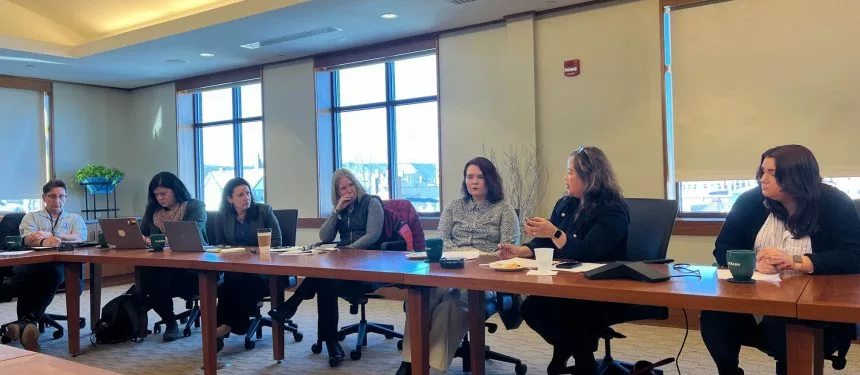[ad_1]
Visa delays concern NH NAFSA members
February 1 marked the first State of New Hampshire NAFSA Region XI meeting in three years. Meetings were put on hold during the pandemic, and as the group regathered in Concord, NH, for the first time in person this week, there were many new faces around the table.
 A major concern that was prevalent amongst the institutions was staffing. Photo: Lou Greenwald
A major concern that was prevalent amongst the institutions was staffing. Photo: Lou Greenwald University representatives included leaders from Dartmouth College, University of New Hampshire, Rivier University, and Franklin Pierce College. The institutional attendees represented multiple areas of the sector, including international student advising, international enrollment and admissions, study abroad, and student affairs.
In addition to institutional delegates, numerous government officials and sector partners attended the gathering, including immigration lawyers from Orr and Reno law offices in Concord.
NAFSA NH state representative Lou Greenwald convened and facilitated the meeting. He told The PIE, “It was great to have immigration attorneys on hand to update the group on changes and new regulations that impact different types of international students, such as H1 students and students on optional practical training.”
It was great to have immigration attorneys on hand
The most pressing topic discussed by the group, however, was visa delays and denials, with the predominance of denials coming from Nigeria, Ghana, and certain cities in India, according to the group.
Participants stated the longest backlog of visa appointments have been for F, M, and J visas but also cited long delays for F2-2 (family dependent) visas as well. Greenwald shared that universities can apply to expedite visa appointments with proof of start date of classes for an additional fee.
Attendees also noted the dramatic increase in visa filing fees, indicating certain types have increased from $370 to $650. Greenwald said Form 765 for adjusted status is now $650 with an average processing time of 10 months. Meanwhile, Form 539 for family F-1 (the paper version) was formerly $370 and is now $620, with the electric version costing $525.
Leaders underscored their concerns about visa “shopping.” Greenwald stated, “Some students enter the U.S. on an initial I-20 then transfer out to another school that’s higher ranked or cheaper.”
And while there remained some degree of concern on over-reliance on India, as universities continually seek more diversity, other institutions are seeing an increase in applications from Colombia, Vietnam, and the Philippines.
Representatives from the NH department of motor vehicles attended the meeting and outlined the process for international students to obtain driver’s licenses, discussing the type of paperwork required and the additional steps students must take in order to drive in the US.
Staffers from congressman Chris Pappas’ office and congresswoman Ann Kuster’s office also attended the meeting to hear concerns voiced by university leaders. A major concern that was prevalent amongst the institutions was staffing. “Staffing is still an issue in admissions and student services,” said Greenwald.
[ad_2]
Source link
Meet Our Successful Graduates: Learn how our courses have propelled graduates into rewarding
careers. Explore their success stories here!
Discover More About Your Future: Interested in advancing your teaching career? Explore our
IPGCE, MA, and QTS courses today!

Explore Our Courses: Ready to take the next
step in your education journey? View our
comprehensive course offerings now!

